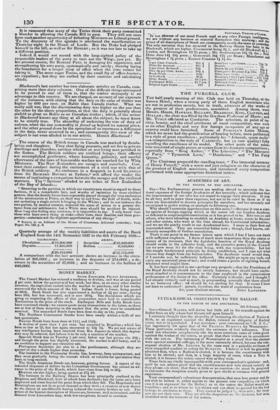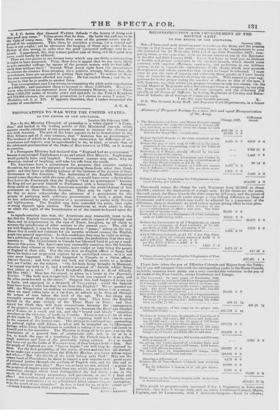ULTRA-RADICAL OBJECTIONS TO THE BALLOT.
TO THE EDITOR OF THE SPECTATOR.
5th February 1839.
Sur—General NAPIER will derive but little aid in his crusade against the Ballot from an ally whose best thrusts tell upon himself. I certainly thought that the absurdity of instancing the election of Tories at Bath, as an argument against the Ballot, evinced an obliquity of Radical vision not to be paralleled. I was mistaken: your correspondent "N. J. C.," has ingeniously hit upon that of Sir FRANCIS BURDETT for Westminster. These gentlemen evidently discredit the existence of foul influences. They could not otherwise complacently cite the most notorious cases of votes given against the wishes of the voters, as proofs that their wishes are in accordance with the voters. The instancing of Westminster as a proof that the elector* were against extended suffrage, is the more eminently absurd, because the sub- sequent election of Mr. LEADER by the same men is a palpable evidence of their compelled conduct in voting for BURDETT. I believe it will be general! admitted that, when a Radical is elected, it is because the constituency wi; him to be elected; and that, in a large majority of cases, when a Tory is elected, it is because the voters cannot vote as they wish. These facts are Wholly incompatible with your correspondent's opinions: and, until he can adduce proof that the constituencies now vote almost entirely as they please—in short, that there is little or no coercion—he must be prepared to encounter the reception usually given to ipse dixits at variance with general experience. Your correspondent's voluminous demonstration, that men love power and do not wish to bestow it, either applies to the present vote cornpellets, (in which case it is an argument for the Ballot,) or to the voters the Ballot would ea. franchise; and as to whom he has shown and can show no ground for the bad feelings he attribute* to them. They cannot be judged 1,y their acts ; for their acts are not their own. They are not the shopocrats nu:. the farmers, but unit. ideutified with the interesta of the masses. C. denies that General NAPIER defends " the heresy of doing evil that ood may come." I thus prove that he does. He holds the muff, age to be g the right of every man. He admits that some of the present voiera are de rived of its enjoyment. This, then, he considers a wrong, (or U ,iversal suf. hare is not aright,) yet he advocates the keeping of these men wider the in- fliction of this wrong, in order that the good (universal suffrage) ■nay be ar. dined. I apprehend, Sir, that a more perfect case of doing evil th it good may come, could hardly be adduced. There are two points in my former letter which any one fairly controverting it ought to have answered. First, How does it appear that we are more likely to gain extended suffrage by means of the present system with its fiml influ- ences than without then? Second, What moral right have the non-electors to prevent the electors from escaping from positive wrongs, because they, the noteeleetors, have not succeeded an getting their rights ? To neither of 'these has your correspondent afforded any reply. He has evaded them ; and the in. feremice is, that be is unable to answer them. Your correspondent says I am wrong in computing the adult male non-electors at 5,000,000; and maintains them to amount to above 7,000,000. 51s cc I.• LOCH, who derives his statement from Parliamentary Returns, sacs-" There being 5.813.276 males of twenty years and upwards in the United Kingdom and 812,916 electors, the average proportion is 1 elector in every 7 in "- Statistics, vol. ii. p. 233. It appears, therefore, that I rather overstated the number of non-electors.
J. C. S.



























 Previous page
Previous page